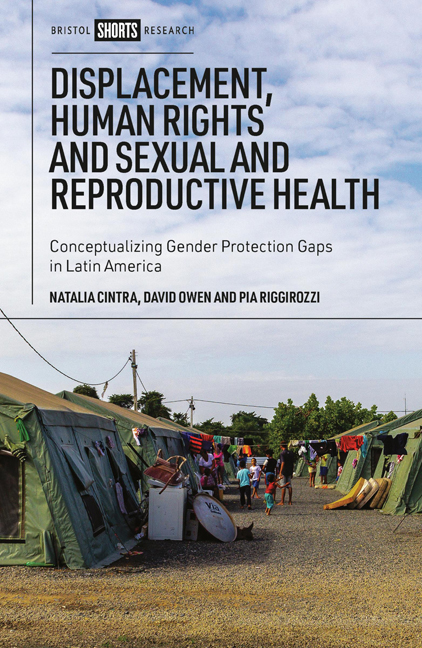 Displacement, Human Rights and Sexual and Reproductive Health
Displacement, Human Rights and Sexual and Reproductive Health Book contents
- Frontmatter
- Dedication
- Contents
- List of Figures and Tables
- Acknowledgements
- Introduction
- One The Gendered Character of Forced Migration
- Two Problematizing the Migrant– Refugee Distinction in Latin America
- Three Latin American Normative Frameworks of Migration and Asylum
- Four Protecting the Human Right to Health of Women and Girls from Venezuela as Necessary Fleers
- Five Responsibility and the Ethics of Forced Displacement in South America
- Conclusion
- Notes
- References
- Index
Three - Latin American Normative Frameworks of Migration and Asylum
Published online by Cambridge University Press: 18 January 2024
- Frontmatter
- Dedication
- Contents
- List of Figures and Tables
- Acknowledgements
- Introduction
- One The Gendered Character of Forced Migration
- Two Problematizing the Migrant– Refugee Distinction in Latin America
- Three Latin American Normative Frameworks of Migration and Asylum
- Four Protecting the Human Right to Health of Women and Girls from Venezuela as Necessary Fleers
- Five Responsibility and the Ethics of Forced Displacement in South America
- Conclusion
- Notes
- References
- Index
Summary
Latin American normative frameworks concerning migration and asylum are generally recognized as ‘progressive’, ‘open’ and ‘human rights-based’ (Brumat and Freier 2020; Brumat and Finn 2021; Zapata and Wenderoth 2021; Hammoud-Gallego and Freier 2022). Experts and commentators have praised Latin America for advancing sustained and ‘generous’ asylum and refugee policies since the ratification of the 1951 Convention and its 1967 Protocol on the rights of refugees. This appreciation is normally due to progressive, and indeed vernacular, takes on what it means to be a refugee in Latin America. In effect, the region has formally adopted an expanded definition of refugee going beyond the international refugee regime through the regional framework underpinned by the 1984 Cartagena Declaration (Cantor et al 2015: 3). As explored in Chapter 2, Latin America has reinvented boundaries of what it means to be a refugee in the regional context, a process that Cantor calls ‘localization’ of the international norm on refugees to promote humanitarian and regional cooperation. Interestingly, this expansion took inspiration from the mass displacement experienced in Central America as a consequence of civil wars during the 1980s as the Cold War took hold in Latin America (Cantor 2013). This was written into the Declaration itself: ‘in view of the experience gained from the massive flows of refugees in the Central American area, it is necessary to consider enlarging the concept of a refugee’. Indeed, signatory states agreed the existing international refugee system did not provide some groups of forcibly displaced persons in the Americas with the appropriate legal response, rendering it necessary to develop a more appropriate concept to the region's characteristics.
Significantly, the broader definition of refugeehood offered by Cartagena includes not only those who have been individually persecuted, but also those whose lives and liberties were threatened by a series of different circumstances. It therefore did not require a ‘subjective’ element: a subjective fear of a threat. An objective situation, translated in a factual occurrence, such as, for instance, an armed conflict, was enough to justify international protection under the auspices of regional refugee law.
- Type
- Chapter
- Information
- Displacement, Human Rights and Sexual and Reproductive HealthConceptualizing Gender Protection Gaps in Latin America, pp. 64 - 88Publisher: Bristol University PressPrint publication year: 2023


